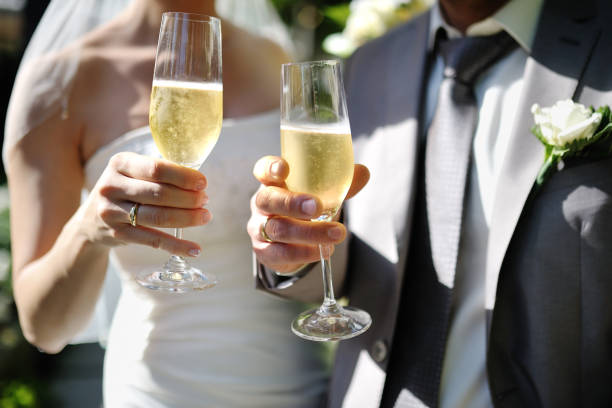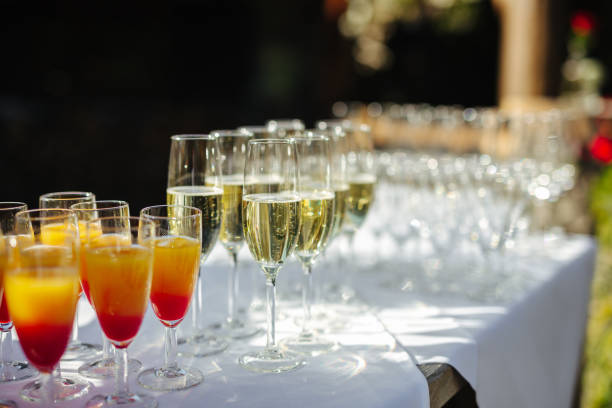What is Liquor Liability Insurance for Bartenders?

Liquor liability insurance for bartenders is an annual policy carried by an individual or a business such as Top Shelf Bartending. It differs from single-use policies such as Host Liability Insurance, and it is not the same thing as a state liquor license.
People looking for services such as wedding reception bartending or larger-scale private party bartending should know a few things about liquor liability insurance, ideally before they book service for their event or reception.
The time leading up to a reception or larger private party – especially for someone about to get married – tends to be busy. The drudgery and minutiae of different insurance policies is the last thing that someone getting married wants to think about.
But hosts should take a few minutes to educate themselves, as the differences in liquor liability insurance versus other insurance policies could be the difference between sufficient coverage and potentially disastrous liability.
This article will briefly discuss liquor liability insurance, and explain the differences between various types of insurance as concisely as possible.
Host Liability Insurance vs. Liquor Liability Insurance

People hosting events at commercial or wedding and reception venues will likely need to purchase one or more insurance policies. While some hosts will roll policies such as liquor liability insurance into the venue’s rental cost, most of the time venue owners require hosts to purchase policies independently.
As noted above, the most common type of insurance policy in situations like this is a host liability policy. This is a wide-net policy protects hosts from most insurance claims.
An average host liability policy likely includes general liability insurance – protection in case a guest falls or twists an ankle – as well as property protection specific to wedding and reception property. This likely means reimbursement if a bridal gown or expensive wedding decoration is damaged.
Most people know that insurance companies are reluctant to take responsibility when claims occur, and notoriously stingy about paying out. It’s a good practice to carefully go over a policy such as a host liability policy with your agent or insurance provider well before your wedding party or reception.
But again, this is typically the farthest thing from the mind of a bride or groom preparing to get married. The burden of ensuring that the insurance policies are both sufficient and buttoned-up properly typically falls to a friend or a member of the family, such as a parent or the maid of honor.
Liquor liability insurance – in this case, liquor liability insurance for bartenders – specifically pertains to alcohol-related claims at bigger events, such as following a wedding service.
What a lot of hosts and venue owners learn the hard way is that host liability policies do not provide sufficient coverage in the event of alcohol-related claims. As most people likely know, claims related to alcohol tend to be costly – often in the six or seven figures – and companies selling single-day host liability policies do everything they can to avoid covering those.
This is why companies like Top Shelf Bartending hold annual liquor liability policies. While our annual policies are expensive, they also provide sufficient coverage – $1 million per claim, $2 million aggregate, in our case – against alcohol-related incidents.
Liquor liability insurance ties in closely to Dram Shop Laws, which are explained better below.
What are Dram Shop Laws?

Dram Shop Laws are liquor laws that vary greatly from state-to-state. Top Shelf Bartending has written a number of articles on Dram Shop Laws, retail liquor liability insurance, and liquor liability insurance for bartenders.
We want everyone – whether they book us for their wedding service or not – to be informed.
Top Shelf Bartending primarily operates in North Carolina and Pennsylvania, with a handful of events in Ohio every year. The liquor laws vary greatly between these three states.
Pennsylvania has some of the strictest liquor laws in the country. The state heavily taxes alcohol, the profits from the sale of alcohol, and sternly enforces alcohol-related crimes such as Driving Under the Influence (DUI). The state has historically made most of it’s revenue from alcohol, directly or indirectly.
By contrast, North Carolina has more passive liquor laws. This isn’t to say that North Carolina doesn’t enforce DUI – it certainly does – but many venues in North Carolina do not require host liability insurance or retail liquor liability insurance in the same way that Pennsylvania does.
Ohio kind of splits the difference. Their Dram Shop Laws are looser than Pennsylvania, but stricter than North Carolina.
In our experience, liquor laws are unique to each state. The onus falls onto the host or venue owner to know their state’s respective liquor laws prior to holding wedding and events, or alcohol service for a wedding party.
As always, we encourage hosts to contact Top Shelf Bartending for in-depth explanation of their state’s liquor laws, and to answer any other questions about liquor liability.
Situations That Could Require Liquor Liability Insurance
As we often say, liquor insurance isn’t necessary for every cookout or holiday party. We don’t try to push liquor insurance onto hosts having 25 or fewer guests in their home, especially when the guests are unlikely to drive after the party.
That said, there are a number of situations where we feel that liquor insurance of some type – either a host liability policy or an annual policy like ours – are not only a good idea, but strongly recommended:
- When Hiring a Bartender for a Wedding Party or Reception
- When Hosting a Wedding Reception
- When Hosting a Party following a Wedding
- When Coordinating or Planning Larger Events, such as for a wedding or concert
We first encourage hosts to speak with venue owners regarding the venue’s specific insurance requirements. Some venue owners are comfortable with hosts purchasing a single-use policy, while other venue owners insist on hosts purchasing the use of an alcohol-specific policy.
As we’ve written, the size and scope of an event is a big factor. Events and private parties that plan to have alcohol service and expect more than ~50 guests are encouraged to obtain some sort of coverage.
The host’s exposure grows rapidly with the guest count. When guest counts get into the 50-100 or greater range, there’s sure to be at least one bonehead who doesn’t know how to control him or herself with regard to alcohol consumption.
It’s in the host’s best interest to purchase alcohol-specific insurance protection, or hire an insured bartending service such as Top Shelf Bartending, to make sure that a party doesn’t become a problem.
Special Considerations for Wedding Service Bartending

Bartending for a wedding service or a wedding party requires special consideration. In this case, hosts are typically “giving away” alcohol to guests – rather than selling it, as a bar or “dram shop” would – and they need to be educated on both the venue’s house policies as well as their state’s specific liquor laws.
Companies like Top Shelf Bartending that focus on wedding and events service are distributing “free” alcohol in as safe a manner as possible. While every wedding and reception walks the line between a joyous celebration and deliberate over-serving, it’s role of companies like Top Shelf to limit a host’s liability as much as possible.
We strive to do this through sensible liquor control. It’s certainly not fun to tell guests at a wedding party or reception to slow down, or even to cut them in certain circumstances. But our role is to look out for the interests of both the venue and our clients.
If a guest has had too much to drink, and they are becoming a danger to both themselves and other guests, it’s our role as professionals to defuse the situation before it becomes an incident.
Hosts who have additional questions about liquor liability insurance for bartenders, Dram Shop Laws, or bartending for a wedding service should contact Top Shelf Bartending, either through our Online Booking Tool or by emailing Top Shelf directly.




Pingback: How To Hire Bartending Service For Wedding Receptions